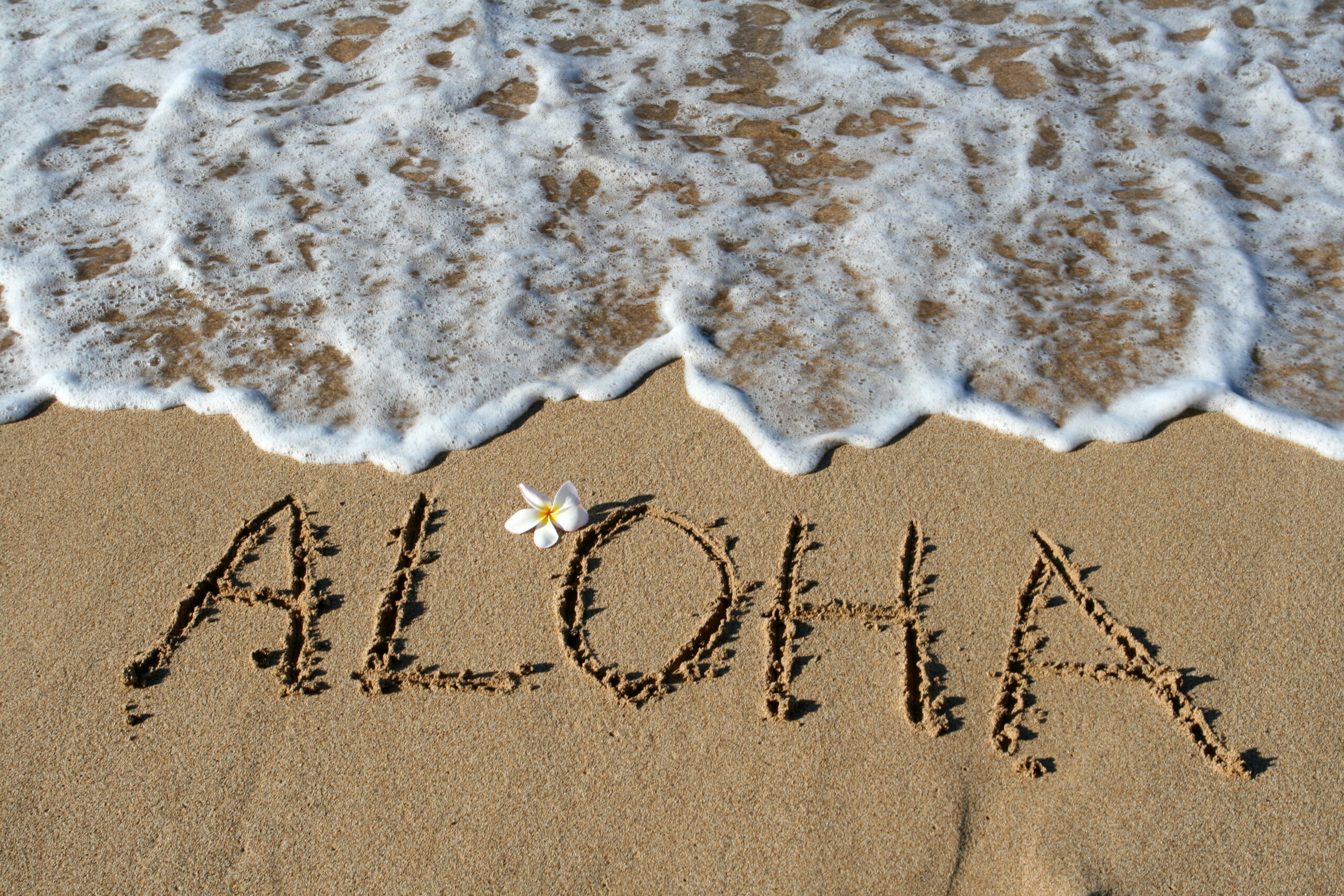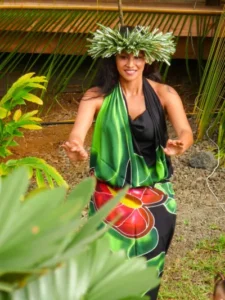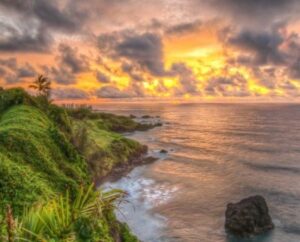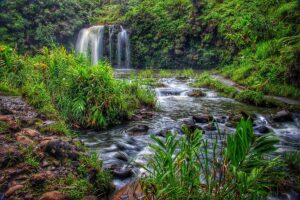
Quotes and Proverbs of Maui, Hawai’i
Over the years writers, poets and artists of all mediums have strived to express the feeling of the inspiring beauty of Maui. This has resulted in many famous quotes starting in 1866 with Mark Twain and is still ongoing today with famous entertainers, mostly who live or are from Hawaiʻi.
Expressing Hawaiʻi with Words
Proverbs of ancient Hawaiʻi are wise words that are still relevant today and give us a glimpse of the Hawaiian culture loved so much around the world. These proverbs are the ways of Aloha and are still taught to local children just as the ancient peoples of this land once taught their children.
Hawaiian Language Quotes, Proverbs And Phrases

Since there was no writing in ancient Hawaiʻi the role that the spoken Hawaiian language played in the daily life of ancient Hawaiians was huge. All things in their life, from birth to death and beyond was explained and described. From tiny bits of bone and shell found outside an octopus burrow (‘ahilu) to a narrow channel running along a tide pool (‘amio) to the chill from being in a particular kind of wind (huehu) the Hawaiian language guided every facet and detail of their world. There chants and prayers were part of most every activity in the course of a day. From fishing to farming to eating to building and medicine, the language was used with much mana (spirit or power) to bring about wellbeing and balance.
They had many proverbs and one of the most well known and used is “i ka olele no ke ola, i ka olele no ka make. (in language there is life, in language there is death) This proverb has many meanings and points to the huge importance and respect Hawaiians have for their language. This is why it is important to learn some of the language and meanings if you’re visiting…it will go a long way in creating some Aloha with the locals you’ll meet.
Proverbs of Love in ʻŌlelo Hawaiʻi
Kahuna Nui Hale Kealohalani Makua – “Love all you see, including yourself.” — Hale Makua
E Hoomau Maua Kealoha – (May our love last forever.)
Aloha Aku No, Aloha Mai No – (I give my love to you, you give your love to me.)
`A`ohe loa i ka hana a ke aloha – (Distance is ignored by love.)
Ua ola loko i ke aloha – (Love gives life within.)
He kehau ho`oma`ema`e ke aloha – (Love is like a cleansing dew.)
He ‘Olina Leo Ka Ke Aloha – (Joy is in the voice of love.)
Ho’i Hou Ke Aloha – (Let us fall in love all over again.)
No Keia La, No Keia Po, A Mau Loa – (From this day, from this night, forever more.)
Hele mai ho’ohiwahiwa – (To honor.)
Noho me ka hau’oli – (Be happy.)
Kuhi no ka lima, hele no ka maka. – (Where the hands move, there let the eyes follow.)
Proverbs of Inspiration in ʻŌlelo Hawaiʻi
Kulia i ka nu’u – (Strive to reach the highest.)
Mohala i ka wai ka maka o ka pua – (Unfolded by the water are the faces of the flowers.)
Ua ola no i ka pane a ke aloha – (There is life in a kindly reply.)
`A`ohe lokomaika`i i nele i ke pâna`i – (No kind deed has ever lacked its reward.)
A’a i ka hula, waiho i ka maka’u i ka hale – (Dare to dance, leave shame at home.)
‘A’OHE PU’U KI’EKI’E KE HO’A’O ‘IA E PI’I – (No cliff is so tall it cannot be climbed.)
Ua Kuluma Ke Kanaka I Ke Aloha – (It Is Natural For People To Behave In a Loving Way.)
Ku’ia kahele aka na’au ha’aha’a – (A Humble Person Walks Carefully So As Not To Hurt Others.)
E hele me ka pu’olo – (Always Take An Offering With You. Make Every Person Place or Condition Better Than You Left It Always. Wherever You Go, Always Take Something With You.) …This Is The Sacred Hawaiian Way, the Way of Abundant Flow Honoring Ke Akua (God) and His Creation Which is Nature.)
Learn more on the Road to Hāna
Way Of Aloha

It’s Not Just Hello and Goodbye – It’s a Lifestyle!
The word Aloha is known worldwide. This is because anyone who visits Hawaiʻi becomes charmed by the incredible beauty of these isolated islands. Aside from the standard “hello and goodbye” definition of the word there lies a much deeper meaning. Ancient Hawaiians held strong beliefs about the land and because they had no written language they became masters of storytelling and recounting history through chants and legends. The spirit of Aloha was like a cultural guidance system for ancient Hawaiians who taught their children “The Ways of Aloha”.
In the old days of Hawaiʻi it is said that aloha meant “what’s mine is yours.” This did not sit well with the new foreigners who held the belief that economic principles outweighed life principles. As these foreigners brought new technologies to the islands things began to change quite rapidly. Today these Hawaiian life principles are making a comeback as is evident from the popularity of Hawaiian quotes, sayings and proverbs.
Values of Aloha
ALOHA:
Aloha is a value, one of unconditional love.
Aloha is the outpouring and receiving of the spirit.
‘OHANA:
Those who are family, and those you choose to call your family.
As a value, ‘Ohana is a human circle of complete Aloha.
KĀKOU:
The value of communication, for “All of us.” We are in this together.
Learn to speak the language of we. The Kaona Is All Inclusiveness. We Are One.
HA‘AHA‘A:
The value of humility. Be humble, be modest, and open your thoughts.
MAHALO:
“Thank you”, as a way of living.
Live in thankfulness for the richness that makes life so precious.
HO‘OHANA:
The value of work: To work with intent and with purpose.
LŌKAHI:
The value of teamwork: Collaboration and cooperation. Harmony and unity.
People who work together can achieve more.
The Kaona of LOKAHI, Is Inherent ONENESS, Connectedness to the Heaven, to the Earth, and All Life and All Relations.
KULEANA:
One’s personal sense of Responsibility and Sacred Duty.
“I accept my responsibilities and Reason for Being, and I will be held accountable.”
HO‘OHANOHANO:
To honor the dignity of others.
Conduct yourself with distinction, and cultivate respectfulness.
NĀNĀ I KE KUMU:
Look to your Sense of Place and sources of spirit, and you find your truth.
‘IMI OLA:
To “seek best life.” Our purpose in life is to seek its highest form.
The value of mission and vision.
‘IKE LOA:
The value of learning. To know well. To seek knowledge and wisdom. We Are Here To Learn, Grow and Expand into Greater Aloha/Love/Harmony as We Walk Up the Mountain of Life.
ALAKA‘I:
The value of leadership. Lead with initiative, and with your good example.
You shall be the guide for others when you have gained their trust and respect.
KA LĀ HIKI OLA:
“The dawning of a new day.” Optimism.
The value of hope and promise.
…and one of the most well known and used philosophies of Hawaiians of yesterday and today:
HO‘OMAU:
The value of perseverance. To persist, to continue, to perpetuate. Never give up.
MĀLAMA:
The value of stewardship. To take care of.
To serve and to honor, to protect and care for.
PONO
The value of integrity, of rightness and balance.
The feeling of contentment when all is good and all is right.
KŪLIA I KA NU‘U:
The value of achievement and excellence. “Strive to reach the summit.”
Pursue personal excellence in all you do.
Hawaiian Wisdom
Ua Lehulehu a Manomano Ka ‘Ikena a Ka Hawai’i
Great and Numerous is the Knowledge of the Hawaiian People
The Process of Ho’oponopono
Ho’oponopono
If Aloha is the Hawaiian code of life, then Ho’oponopono is the Hawaiian code of forgiveness.
PONO – The value of integrity, of rightness and balance. The feeling of contentment when all is good and all is right.

Ho’oponopono means to make right. Essentially, it means to make it right with the ancestors, or to make right with the people with whom you have relationships. We believe that the original purpose of Ho’oponopono was to correct the wrongs that had occurred in someone’s life including Hala (to miss the thing aimed for, or to err, to disobey) and Hewa (to go overboard or to do something to excess) which were illusions, and even ‘Ino (to do harm, implying to do harm to someone with hate in mind), even if accidental.
It is called the Hawaiian Code of Forgiveness and it’s an important thought because when we forgive others, who are we forgiving? Ourselves, of course.
Why would forgiving ourselves affect anything “out there”? The secret is there is no such thing as “out there” – everything happens to you in your mind. Everything you see, everything you hear, every person you meet, you experience in your mind. You only think it’s “out there” and you think that absolves you of responsibility. In fact it’s quite the opposite: you are responsible for everything you think, and everything that comes to your attention. If you watch the news, everything you hear on the news is your responsibility. That sounds harsh, but it means that you are also able to clear it, clean it, and through forgiveness change it.
There are four simple steps to this method, and the order is not that important. Repentance, Forgiveness, Gratitude and Love are the only forces at work – but these forces have amazing power.
1. REPENTANCE
I’m sorry
Ho’oponopono assumes you are responsible for everything in your mind, even if it seems to be “out there.” Once you realize that, it’s very natural to feel sorry.
This realization can be painful, and you will likely resist accepting responsibility for the “out there” kind of problems until you start to practice this method on your more obvious “in here” problems and see results.
So choose something that you already know you’ve caused for yourself? Over-weight? Addicted to substances? Do you have anger issues? Health problems? Start there and say you’re sorry. That’s the whole step: I’M SORRY. You may wish to say it more clearly: “I realize that I am responsible for the (issue) in my life and I feel terrible remorse that something in my consciousness has caused this.”
2. ASK FORGIVENESS
Please forgive me
Don’t worry about who you’re asking. Just ask! PLEASE FORGIVE ME. Say it over and over. Mean it. Remember your remorse from step 1 as you ask to be forgiven. The main idea here is not to forgive others transgressions, but to assume you have the mana (spirit or power) to forgive yourself for that which is “out there”. To forgive yourself is to forgive all that has happened or ever will happen because we are all one.
3. GRATITUDE
Thank you
Say “THANK YOU” – again it doesn’t really matter who or what you’re thanking. Thank your body for all it does for you. Thank yourself for being the best you can be. Thank God. Thank the Universe. Thank whatever it was that just forgave you. Just keep saying THANK YOU.
4. LOVE
I love you
This can also be step 1. Say I LOVE YOU. Say it to your body, say it to God. Say I LOVE YOU to the air you breathe, to the house that shelters you. Say I LOVE YOU to your challenges. Say it over and over. Mean it. Feel it. There is nothing as powerful as Love.
That’s it. The whole practice in a nutshell. Simple and amazingly effective.
According to ancienthuna.com here is another way to consider practicing Ho’oponopono:

The Process of Ho’oponopono:
- Bring to mind anyone or issue with whom you do not feel total alignment or support, etc. In your mind’s eye, construct a small stage below you
- Imagine an infinite source of love and healing flowing from a source above the top of your head (from your Higher Self), and open up the top of your head, and let the source of love and healing flow down inside your body, fill up the body, and overflow out your heart to heal up the person or issue on the small stage. When the healing is complete, have a discussion with the person or issue and forgive them, and have them forgive you.
- Next, let go of the person or issue and see them floating away. If you are healing in a current primary relationship, then assimilate the person inside you.
- Do this with every person and issue in your life with whom you are incomplete, or not aligned.
- The final test is, can you see the person or think of them without feeling any negative emotions. If you do feel negative emotions when you do, then do the process again.
Learn more on our Haleakalā Sunrise Tour
Quotes About Hawaiʻi From Past and Present
For over 100 years the beauty of Hawaiʻi has lived in the hearts of those who have visited and lived in this beautiful part of the world. Here are just a few from the past and present. Hopefully they can inspire you to come up with a quote of your own!
Past
Mark Twain (1835-1910) loved Hawaiʻi. He spent five weeks exploring the islands in 1866. As a reporter for the Sacramento Union newspaper his letters about the Hawaiʻi (which he called the Sandwich Islands) where Americans’ first information about these beautiful islands and were part of the beginning of Twain’s fame as a writer.
You can read Twain’s writings about Hawaiʻi in his book Roughing It in the Sandwich Islands, available in paperback on Amazon.
Twain called Hawaiʻi “The loveliest fleet of islands that lies anchored in any ocean.” Like most people who visit he often thought about Maui when he was not there.
Here are some of his most popular quotes:
“No alien land in all the world has any deep strong charm for me but that one (Maui), no other land could so longingly and so beseechingly haunt me, sleeping and waking, through half a lifetime, as that one has done. Other things leave me, but it abides; other things change, but it remains the same. For me the balmy airs are always blowing, its summer seas flashing in the sun; the pulsing of its surfbeat is in my ear; I can see its garlanded crags, its leaping cascades, its plumy palms drowsing by the shore, its remote summits floating like islands above the cloud wrack; I can feel the spirit of its wildland solitudes, I can hear the splash of its brooks; in my nostrils still lives the breath of flowers that perished twenty years ago.”
“I went to Maui to stay a week and remained five. I never spent so pleasant a month before, or bade any place goodbye so regretfully. I have not once thought of business, or care or human toil or trouble or sorrow or weariness, and the memory of it will remain with me always.”
“In my nostrils still lives the breath of flowers that perished twenty years ago.”
Though travel was arduous in the late 18oo’s few traveled by ship to Hawaiʻi for leisure. It was during this era on Maui that the economy was shifting from whaling to sugar. In 1866 Mark Twain took advantage of the newly launched steamer passenger and cargo service from San Francisco to Hawaii which dramatically reduced the travel time from 21 days to 10 days. His travel letters published in the Sacramento Union newspaper raised American awareness of these beautiful islands and started the visitor industry!
Present
Famous people not only love Hawaiʻi but many have homes here. In Maui you never know if you might famous musicians like Willie Nelson, Mick Fleetwood, Jack Johnson or Steven Tyler doing impromptu gigs or sit ins at local bars. They all have homes here on the island and visit often. Other entertainers simply reference Maui as a luxurious or extravagant place. Some have fallen in love with the lifestyle and can’t help writing about it.
Here are a few modern day quotes from people you’ve heard of and maybe some you haven’t…Enjoy!
“I love Hawaiʻi. I really enjoy surfing in Oahu, and Waianae is such a great area. And Maui – I like Maui a lot, too.”
– Troy Polamalu
“I can’t even speak Hawaiian, but if you go there and listen to a Hawaiian song, you get captured because it’s so beautiful, like the melody is just gorgeous and you know Bob Marley is on the radio every single day. It’s very reggae-influenced down there. Basically, you haven’t been to paradise if you haven’t been to Hawaiʻi.”
– Bruno Mars
“Most of my ukulele heroes were traditional players from Hawaiʻi, like Eddie Kamae and Ohta-san. There may not be uke stars in popular culture, but there are certainly pop stars that play uke – George Harrison, Eddie Vedder, Taylor Swift, Train, and Paul McCartney.”
– Jake Shimabukuro
“Hawaiʻi is paradise. It sounds cheesy to say it, but there’s music in the air there.”
– Bruno Mars
“I grew up in a musical family; the majority of my growing up was done in Hawaiʻi. It’s what we do. You sing, you dance, you play ukulele and you drink.”
– Dwayne Johnson
“Kaohinani is a Hawaiian word meaning gatherer of beautiful things.”
– Rob Brezsny – a writer, poet, and musician.
“Aloha is the unconditional desire to promote the true good of other people in a friendly spirit out of a sense of kinship.”
– Abraham Akaka –Rev. Akaka was Kahu (shepherd) of Kawaiahaʻo Church in Honolulu,
“Nature is where it all begins for the Hawaiians. In fact, they call themselves ‘keiki o ka aina…’ children of the land”
– M.J. Harden Author of Voices of Wisdom Hawaiian Elders Speak – Owner of Hike Maui
“I believe Hawaiʻi is the most precious jewel in the world.”
– Don Ho
“Whether a visitor or kama’aina (resident), the beauty of the Hawaiian Islands inspires the heart and mind.”
– Unknown
“I can always remember that experience in Hawaiʻi pleasantly on account of Elvis.”
– Minnie Pearl
“For me the magic of Hawaiʻi comes from the stillness, the sea, the stars.”
– Joanne Harris best known for her award-winning novel Chocolat
“Hawaiʻi is the island of big dreams for both islanders and guests. Those dreams born in paradise can, indeed come true.”
– Sharon Linnea writer of award-winning biographies of Princess Ka’iulani
Well there you have it. It’s quite amazing how many Hawaiian phrases, quotes and proverbs are used today. It is a fitting testament to how much everyone loves the Hawaiian culture and how it resonates with the fun and joyful wisdom that we can all learn something from. If you wish to get some first hand knowledge about Maui and the culture try a Road to Hāna Tour or Haleakalā Sunrise Tour next time you visit Maui. Traveling this part of Maui with a guide is one of the best was to get a feel for the day to day life of living in Maui and the Hawaiian culture!
Aloha Nui Loa








